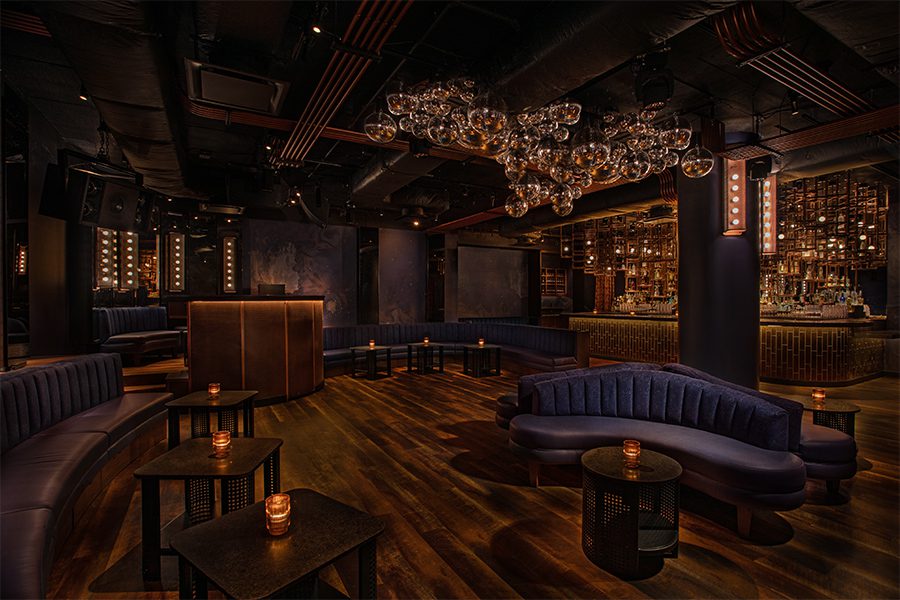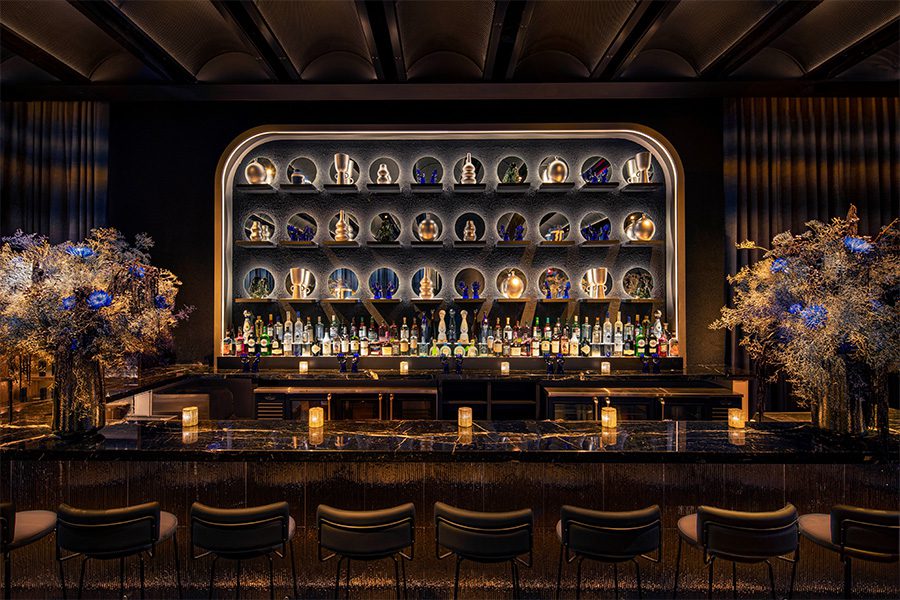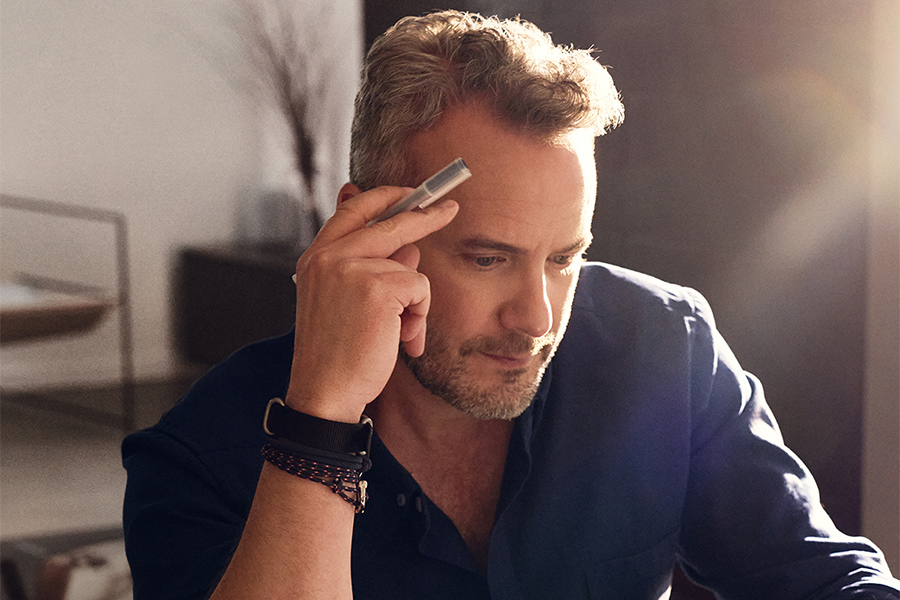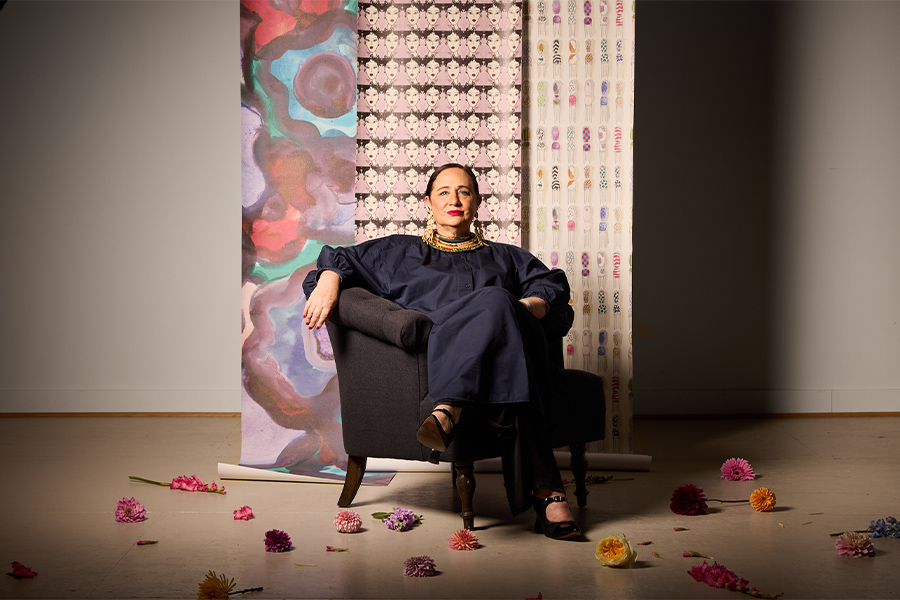The story of best friends and business partners Noah Tepperberg and Jason Strauss is one that movies are based on. While Tepperberg spent his early childhood in Brooklyn, they both grew up in Manhattan and met when they were in high school. Tepperberg got into the nightlife promoting business after he threw a cast party for Stuyvesant High School’s annual musical (he also had relationships with people in the bar and club business through his older brother, who had a band); Strauss was captain of the football team at Riverdale Country School and got his feet wet throwing the Homecoming party, which is ironically where he first met Tepperberg. “From that, we started doing prom parties and collegiate parties, and soon, older people in the industry found out that we could wrangle people and be pied pipers,” Strauss says.

Tao Group Hospitality’s Noah Tepperberg and Jason Strauss
Tepperberg went to the University of Miami and Strauss attended Boston University, but they continued promoting both at school and on breaks, communicating via fax and beepers, enticing people to come to their events (which grew to spring break packages) through “old-school, hand-to-hand” tactics: calling their rolodex on a landline phone and meeting at Kinko’s late night to print flyers.
“We would get creative,” explains Strauss. “I [remember] I made a flyer that looked like a parking ticket, and we [put a flyer on] every car at the cafeteria—[anything] to get notoriety.” Adds Tepperberg: “At one point, we started sharing papers [since] we were taking the same business classes and for our final project senior year, we both did a business plan on opening a nightclub. We were entrepreneurs even in college; we always got together during the breaks and figured out ways to throw parties, make money, bring our social circles together, and that was the foundation for what we have today. Three decades and a couple generations later, we are still doing it, just on a much bigger scale.”
Those college parties, dubbed “Jason and Noah present” on their fliers, continued after graduation, moving from an off-campus house to a small office in New York as well as their studio apartments, where they enlisted the help of friends to make calls and answer phones. Soon they were running multiple events a week, packing places with a discerning, sought-after clientele. “You would get on our guestlist by leaving a message on our answering machine,” remembers Tepperberg. “We always knew how well our clubs were going to do by the length of the beep, because [that meant we had] a lot of messages for that night.”
Changing the Game

A 20-foot-high, projection-mapped Quanyin statue commands attention at the Rockwell Group-designed Tao Downtown in New York
Their promotion business grew into Strategic Group, a full-fledged marketing, PR, and special events company that offered their roster of Fortune 500 companies the novelty of all three services under one roof. The natural next step was to create the same magic in their own brick and mortar locations. First were a few celeb-favorite hangouts in the Hamptons including Conscience Point and Jet East, then came Manhattan haunts Luahn and Suite 16. “We [became] really seasoned in ways to communicate with the corporate world, as well as to bring this club culture to a corporate world and unite them in a marriage,” explains Strauss.
In 2003, they introduced gamechanger Marquee. Housed in a former parking garage in New York’s up-and-coming Chelsea neighborhood, it was the first nightclub to offer a large dance floor for house music (complete with an elevated DJ platform) and a room for R&B and hip-hop, catering to multiple audiences. Plus, they brought everything in-house, even the promoters, to create a family-like atmosphere. “We had a vision: We were going to introduce a high-end, bottle service, scene-driven nightclub that was going to cater to my and Noah’s database that we had been collecting and curating for so long,” explains Strauss. “We scraped the money together hand-to-mouth and got the place opened.”

Studio Collective designed the earthy Lavo Ristorante, on West Hollywood’s Sunset Strip
It became the hotspot in New York, packing 1,200 people nightly with lines wrapped around the block. Twenty years later, Marquee has defied all odds with its longevity, and continues to evolve, thanks to the ability to attract top DJs. In fact, for more than a decade, the duo has presented the Marquee case study at Harvard Business School, something Tepperberg looks forward to every year.
Building an Empire

The San Diego outpost of Lavo, designed in-house is decked out with artwork by Peter Tunney
Marquee was just the beginning. Marc Packer and Rich Wolf, owners of Tao restaurant in Midtown Manhattan, had hired them to throw events there; Tepperberg and Strauss brought them in as partners for Marquee. Two years later, in 2005, the foursome opened Tao Las Vegas together, and Tao Group Hospitality was born.
Tao Las Vegas was another first: a one-stop shop for guests with a bar/lounge, restaurant, and nightclub all rolled into one dramatically designed space—a series that built up throughout the night. “It was the natural evolution to go from having just a nightclub to having a nightclub and a restaurant all in the same building,” says Tepperberg. “We were the first people to take that business model from New York to Las Vegas, from separate restaurants and clubs to bringing them together. That’s why I believe it was so successful.” Plus, Strauss moved out to Sin City to oversee the operations from homebase and still lives there, splitting his time with LA.

The centerpiece of Tao Downtown is the dramatic staircase redolent of a performance venue
From there, the Tao Group continued to grow and innovate, rolling out more signature concepts and masterminding new ones—from New York and Las Vegas to Los Angeles, Chicago, and Singapore. There are now 10 Tao locations, six outposts of Italian eatery LAVO, and three Beauty & Essex restaurants (with one on the way), where a pawn shop entrance reveals an eclectic dining room, to name a few. “Sometimes the deal calls for an existing concept, and sometimes it doesn’t work for various reasons, whether it’s the partnership, location, the market. In some markets, we have so many places that our only option is to create new brands,” explains Tepperberg. “When you do multiple versions of a brand, they tend to get better every time. Our model is never to do the same exact place. We have an 80/20 rule: 80 percent the same and 20 percent new for each one.”
That rings true for Tao Downtown in New York, where a massive staircase with seating leads down to a dining room that’s guarded by a 20-foot-tall Quanyin statue projection mapped with waterfalls, birds, and tattoos. Designed by Rockwell Group, it also features private dining rooms lining the mezzanine and, in true Tao Group fashion, a next-door nightclub.
Moving on Up

Designed by Rockwell Group, a curved stair leads to Sake No Hana at the Moxy NYC Lower East Side, which exudes a 1980s punk vibe
Their success in Vegas brought in new opportunities. “As nightlife started hitting places like Vegas, the rest of the world started paying attention that nightlife could raise all boats,” says Strauss. “If you had great nightlife and a great energetic food and beverage program, the room rates would explode and the desire for guests to be in the hotel really came alive.” That led to creating all the outlets at the Dream New York and Dream Hollywood hotels and crafting 15 F&B concepts for four Moxy hotels in Manhattan in just seven years. “We grew up here, right? So having the ability to do that much, to have that much scale all in our hometown, all downtown between Broome and 36th Street, was a great opportunity,” says Tepperberg. “And do it with someone like Mitch [Hochberg, president of development firm Lightstone Group], who has decades of experience and would deliver on these incredible integrated developments.”

Vintage nightclub vibes are on display at the Rockwell Group-designed Loosie’s in the Moxy NYC Lower East Side
Most of the Moxy concepts are new. Take rooftop outlet Magic Hour at the Moxy NYC Times Square that comes complete with a rotating carousel where guests can take in the views; Cathédrale restaurant at the Moxy NYC East Village, which features a massive mesh sculpture suspended from the soaring dining room ceiling; or sophisticated lounge the Fleur Room at the Moxy NYC Chelsea, which takes its design cues from the nearby Flower District. Most recently, they opened five venues at the Moxy Lower East Side, including Silver Lining Lounge, a blue-swathed piano bar; and the Highlight Room, their LA staple reimagined for the New York market, both designed by New York and London-based Michaelis Boyd; and Loosie’s, a retro-inspired nightclub crafted by Rockwell Group.
But bringing multiple concepts under one roof is no easy feat: “Standalone operators would have a lot of learning when they come to an integrated property resort like a Dream or a casino,” Strauss says. “It’s a different way of communicating, a different way of operating. We got that skillset early.”
Acquiring Minds

Hakkasan venue Ling Ling Dubai, located on the 23rd floor of Atlantis the Royal, features interiors by Gilles & Boissier
Part of their growth is thanks in part to two major deals. In 2017, Madison Square Garden Entertainment (MSGE) paid $181 million for a 62.5 percent controlling stake in the Tao Group (in 2016, the company reported $235 million in revenue, according to reports surrounding the deal).
Then, in 2021, the company became one of the largest F&B operators in the world, with more than 80 venues across four continents, when Tao acquired the Hakkasan Group. “It was an opportunity that came to us during COVID,” explains Strauss. “The controlling company that owned the Hakkasan Group wanted to sell or find a partner, and we were the obvious partner because we have so much synergy and, essentially, they were our biggest competitor, especially in Las Vegas. If we could merge the two it was one-plus-one-equals-three, right off the bat.” Adds Tepperberg: “They had an incredible team that we seamlessly fit right into the TAO team and became one bigger, better team.”

A rendering of Miami’s upcoming Ken Fulk-designed Casadonna restaurant, a collaboration between Tao Group Hospitality and David Grutman’s Groot Hospitality
Not only doubling the size of their company overnight, the duo, now co-CEOs, gained venues, and even better, an infrastructure in the UK and UAE, places they had been eyeing for expansion. One of the latest Hakkasan openings is the fourth outpost of Ling Ling on the 23rd floor of the Atlantis the Royal in Dubai. Designed by Parisian duo Gilles & Boissier, the dining room and lounge have a moody, yet feminine feel with colorful artwork and lush greenery, while the outdoor terraces offer heady views of the Arabian Sea and Dubai’s skyline.
“I always say that for Jason and I [our journey] is a rollercoaster. It’s up and down, fast and slow, but it’s always thrilling and always a ride,” says Tepperberg. “For the first 27 years of our career that was definitely the case, and the last three with the Hakkasan [acquisition] and the pandemic have been that plus-plus.” That may amplify with two more exciting projects in the works: Casadonna restaurant in Miami with restaurateur and longtime friend David Grutman, and the first Tao hotel, slated for Orlando in 2025.
Form Meets Function

A commanding mesh sculpture hangs from the ceiling at the Rockwell Group-designed Cathédrale in the Moxy NYC East Village
Besides having the right mix of people, music, and food, Tao Group venues are known for their dramatic designs dripping in layered details—thanks to partnerships with firms like Rockwell Group and ICRAVE, and Tao’s vice president of design and development Susan Nugraha and chief development officer Derek Silberstein.
“This team has worked with us for a long time, so they know our eye, they know our aesthetic,” says Strauss. “Noah and I are still signing off on big-ticket items, but they’re doing the legwork. I will say we spend a lot of time trying to think timelessly in the design, instead of trend-driven, because we know that we need to be there for 20 years when we sign a lease.”

The Fleur Room LA boasts botanical-inspired light fixtures at the bar
Adds Tepperberg: “We learned early on that you need to design your venues inside-out. Design the heart of the house—the back of the house—first and make sure that you have the functionality that you need, then do the sales and figure out how many seats [you need to make the numbers work], and how much space you have after. We’ve seen a lot of people make the mistake to design [the front of the house first]. It really has to be the other way around.”
The two design not for their tastes, but for what they think other people will like—and what will translate “to people, but also physically in materiality,” he says. “We’re good at what we do, but we’re also aware of what we’re not good at and try and find people who are better than us and surround ourselves with those people.”
All in the Family

Ling Ling Dubai blurs the line between indoors and outdoors
Part of their success is their partnership, which is more like a family than a business relationship. They text or talk throughout the day, travel together, and Strauss is the godfather of Tepperberg’s son. “Our history is our backbone,” says Strauss. “The fact that we started so young, experienced so much together—[from] the adolescence of nightlife where it was this weird business and full of gray areas to a corporate level. None of the wins would mean as much unless we had each other to share them with. When I moved to Vegas, we were able to divide and conquer.”
Adds Tepperberg: “When you have a partner who understands the ins and outs on the other side, it makes you overall a stronger group. I know exactly the things to ask Jason to do and he knows exactly what to ask me to do. That type of synchronicity doesn’t just come, even with practice. It only comes with time. You can’t buy or fake 30 years of working together and being with someone who you started with in the exact same place.”

The Michaelis Boyd-designed Silver Lining at the Moxy NYC Lower East Side is an intimate lounge and piano bar
Asked what Strauss’ strength is, Tepperberg says: “He’s an amazing leader. He leads by example, he can hit every facet of a business, and be the smartest guy or the most strategic thinker. He gets everyone’s trust immediately because they can smell it on him, and they know that he has the wherewithal to lead them.”
As for Strauss, Tepperberg says his “greatest strength is his ability to read a room, and to understand how to make connections with people. That’s almost priceless.” He goes on, “We both share the authenticity card. You can’t buy it, you can’t teach it, you can’t train it. When you have a partner who’s 100 percent as authentic as you are, it’s special.”
Editor’s Note: After HD’s April issue went to print, it was announced that investment firm Mohari Hospitality would acquire Tao Group Hospitality—from Madison Square Garden (MSG) Entertainment and additional third-party investors—for $550 million. The deal is expected to close this month.
Check back next week for more from Strauss and Tepperberg on a new What I’ve Learned podcast episode.


